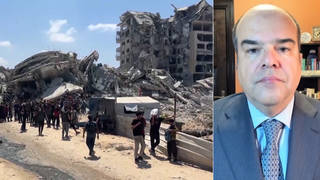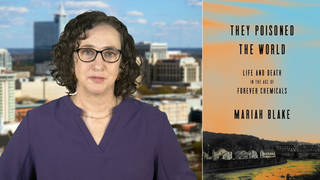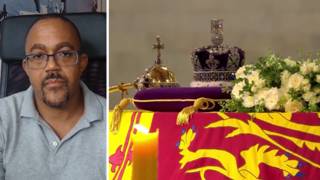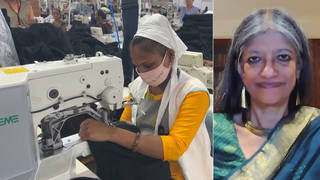
Guests
- Dorbrene O'Mardechairperson of the Antigua and Barbuda Reparations Commission and an ambassador-at-large of Antigua.
- Mutabarukarenowned Jamaican dub poet, musician and radio show host.
We look at how the death of Queen Elizabeth II is prompting former British colonies in the Caribbean to replace the British monarch as their head of state. Antigua and Barbuda’s prime minister has vowed to hold a referendum soon on whether to become a republic, and Jamaica’s ruling Labour Party also plans a vote. The Caribbean at one point formed the heart of England’s first colonial empire in North America, with millions of enslaved Africans taken to the islands, where many were worked to death. Dorbrene O’Marde, chair of the Antigua and Barbuda Reparations Commission, says he is not personally mourning Queen Elizabeth’s death because her reign helped to “cloak the historical brutality of empire in this veneer of grandeur and pomp and pageantry.” We also speak with renowned Jamaican poet and musician Mutabaruka, who says the British monarchy “represents criminal activity” and that the British state needs to make reparations to former colonies like Jamaica to redress the history of abuses. “Actions speak louder than words,” he says.
Transcript
AMY GOODMAN: As King Charles III addresses the British Parliament for the first time as monarch, we begin today’s show looking at the legacy of British colonialism in the Caribbean, where there are growing calls for reparations. The Caribbean at one point formed the heart of England’s first colonial empire in North America. Many of the more than two-and-a-half million enslaved Africans taken to the British Caribbean were worked to death. The string of island nations includes Jamaica, Barbados, the Bahamas, Antigua and Barbuda, and Trinidad and Tobago, among many others now in the British Commonwealth.
Following the death of Queen Elizabeth II, the prime minister of the twin island nation Antigua and Barbuda said voters may soon decide whether to leave the Commonwealth and become a republic. Prime Minister Gaston Browne spoke to ITV News after he confirmed Charles III as king and head of state.
PRIME MINISTER GASTON BROWNE: This is not an act of hostility and any difference between Antigua and Barbuda and the monarchy, but it is the final step, as I said before, to complete that circle of independence and ensure that we are truly a sovereign nation.
IAN WOODS: What sort of time frame would you think on a referendum then?
PRIME MINISTER GASTON BROWNE: So, I’d say within the next, probably, three years.
AMY GOODMAN: This comes after Barbados voted last year to break from its colonial past and become a republic. Meanwhile, in Jamaica, the ruling Labour Party says it also plans to hold a referendum on becoming a republic.
For more, we’re joined in Kingston, Jamaica, by the renowned Jamaican dub poet Mutabaruka, who’s also a musician, radio show host, as well. And in St. John’s, Antigua, Dorbrene O’Marde is with us, the chairperson of the Antigua and Barbuda Reparations Commission, also an ambassador-at-large of Antigua.
We welcome you both to Democracy Now! Dorbrene O’Marde, let’s begin with you. With the death of the queen, first your response, and then what you’re calling for for your country?
DORBRENE O’MARDE: Well, it’s good to be here. Let me say thanks for having me.
In terms of my response, I will be — I will be very measured here. I will recognize that we are talking about death. We are talking about the loss of human life and that the queen would have had family, etc. But I’m under no obligation, I think, to be mourning her death. And that is simply because of, I think, my understanding of history, my understanding of the relationships of the British monarchy to African people and Asian people, but to African people certainly, on the continent and here in the Caribbean. And so that my response is perhaps to recognize the role that the queen, Queen Elizabeth II, has played, how she has managed to cloak the historical brutality of empire in this veneer of grandeur and pomp and pageantry, I guess, and graciousness. But I think that at this point in time we need to examine that history a lot more closely.
JUAN GONZÁLEZ: And speaking of that history, could you — for those people who are not aware especially of the roles of King Charles I and King Charles II in the Caribbean, and especially toward your country, could you talk about that?
DORBRENE O’MARDE: Well, if we look at the role of monarchy, so we are going back now mid-17th century, the 1600s. King Charles I was perhaps the monarch, I think, that opened the trade between Britain and Africa. That was originally gold, minerals, etc. That opened that trade up to human trafficking, to the enslavement, to the movement of enslaved Africans.
King Charles II, who followed him, actually was responsible, along with his then-cousin who later became James I, totally responsible for — and responsible and ownership of the Royal African Company, that moved more Africans off of the continent into the Americas than any other company in history. So, what we’re talking about here is the involvement, the involvement of British monarchy in the ownership and the operation of the transatlantic — I prefer to call it of the European slave trade, the movement of Africans into the Caribbean. And so, we now see this movement.
And even before Charles I, we can be addressing Elizabeth I. And we see this recurrence, of course, in the names that we’re talking about. And so, we now, supposedly, should be mourning the death of Elizabeth II and welcoming a Charles III. But we know them. We know these Charleses, and we know these Elizabeths. So there’s virtually no mourning for me at this moment.
JUAN GONZÁLEZ: I’d also like to bring in Mutabaruka, the renowned Jamaican poet, musician. Your response to the death of Queen Elizabeth and also of the British Empire’s relationship to Jamaica?
MUTABARUKA: Good morning. I am totally in agreement with the first speaker, and I don’t even want to go back into slavery, because a lot of people claim that Queen Elizabeth was not responsible for what her ancestors did. She herself said that slavery was legal at the time, so she don’t really recognize what we in the Caribbean is talking about.
So, we have to realize, in 1952, that was when she ascended the throne of England. And if you check the history between 1952 and now, you will see that even though slavery was abolished, but they, what we call it, redefined slavery and called it colonialism. And colonialism in this part of the world was represented by the throne of England. So, we’re not really talking about the individual person; we’re talking about a corporation, an institution, which is called the monarchy of England, that has totally devastated a lot of the progress we could have made if it wasn’t for this, what we call, colonialism, interpreted to us as slavery still.
Now, we have to remember, in her time, there was the Mau Mau uprising, which is a very interesting case, because she was actually named queen of England when she was in Kenya. And the cruel and wicked things that the British Army did to the African people there cannot be seen as just, “OK, that is just something.” And she had never, never granted any sympathy or said anything that would say, well, you know, of a kind of art to what was taking place.
We look in South Africa during the apartheid system. The British is part of that wicked apartheid regime that demonstrated and killed thousands of Africans who were fighting for right to be a person in South Africa. And it was not ’til just recently and during the time of Mandela and Winnie Mandela that we was told that they were still on the list of terrorist groups. And even though England and this queen was ruling at that time, there was no effort to find out what is it they can do to help to alleviate the problems that confront African people in this part of the world.
Now we come to the Caribbean in this time. The Caribbean has been devastated, we know, in history. One of the richest plantation owners, cane owners, was a man by the name of William Beckford. William Beckford got his riches and became one of the richest men in England by that time. And up to this day, when we recognize how much people died because of the institutionalized slavery that they call colonialism, up ’til this day, that the movement of a people, especially in Jamaica now, where our constitution was given to us by England through the hands of the so-called Bustamante and Norman Manley, who was recognized during that time in 1962, when Jamaica was supposed to be getting independence. They went to England, and they got a constitution that is now part and parcel of what Jamaicans are supposed to live by.
And when we look at that constitution, it does not include ownership of land in Jamaica by the people. If you go into the courts of Jamaica, it says “The Crown versus [inaudible]” or “The Crown versus John Tom.” That is what we have to face right now. Now, when you recognize that, Jamaica is supposed to be an independent city — country. Most Jamaicans in Jamaica now are independent. And even though people say it’s like a — it’s not reaching, not really governing the country. But the head of state is a governor-general representing the queen of England in an independent country. How the hell that can be possible, that you have an independent country that is — that the first lady is the governor-general’s wife, not the prime minister’s wife? And they designed the constitution that way. And this so-called — we call them boss slave, jack-a-dandy slave, that they continue to uphold and maintain that regime that has committed so much atrocities and crimes in this century, in this time, that have been committed and that are still committing it.
I would also why we should now sit down and say, 12 days of mourning, that is sure all backward and all what we call the Stockholm syndrome, has grabbed our leaders in the Caribbean, that here’s a family that represent criminal activities, as far as your ancestors, and now you start to love them. How is that possible? How is that possible that we who know the history is keep repeating the history? We know what has taken place in this democratic — so-called democratic country, that it’s still honoring the most gruesome and cruel monarchy that ever exists, and we know of it. How can we know it and say we’re going to have 12 days of mourning? Twelve days of mourning for what? What we mourning that for? Why are we not mourning for the thousands and millions of people that died across the Atlantic Ocean? We’re not mourning for all the warriors of our time. There’s no day for Tacky, there’s no day for Nanny, all of these people who died because they stand up and struggle to get over the claws of British colonialism.
AMY GOODMAN: Mutabaruka —
MUTABARUKA: We don’t sit and say we must mourn. I am not one of them who’s mourning, and I can’t [inaudible], who don’t see it as a mourning time.
AMY GOODMAN: Mutabaruka, I wanted to ask your response to Charles, at the time Prince Charles, just a few weeks ago praising the contribution of Jamaicans to British life as immeasurable in a message commemorating Jamaica’s 60 years of independence from the U.K. Now you have Jamaica also talking, like Antigua and Barbuda, of a referendum on complete independence, on becoming a republic. What would — what do you think the outcome of that will be? And what would reparations and an apology look like to you, be adequate for you? By the way, it’s an honor to speak with you again after so many years, having talked to you in Brooklyn.
MUTABARUKA: Those years and years, yes. All right. What he is saying is what we expect him to say. Now, actions speak louder than words. And if he is here now to do certain things, he must understand how we feel as African people in this part of the world and what his family and ancestors did. So, to adress the situation is not just to say why he’ll feel bad about what is happening. That is not apologizing. He did that already. He came to the Caribbean and said, “Well, I feel bad about what was happening.” We need somebody saying, “Look at, we see what happened, and we was responsible for it, and we’re sorry, and we’re going to make amends.”
And the amends come with what we call, what them call, getting something going between the different countries then to facilitate reparations and repatriation, because we’re not taken back home, for those who desire to go back to Africa, because we came to Jamaica not by free will but by force. Nobody asked to come to the Caribbean, not these Africans. At least my ancestors never asked to come here. So, the Rastafari community is crying out, saying, “Reparation! Repatriation!” meaning that those who is desirous of going back to Africa must be able to do this without the argument about Commonwealth of Nations. And that is really ignorance. There is no moving away from the queen and the monarchy if the countries that claim getting rid the monarchy is won, but if you still in the Commonwealth of Nations, that’s still binding up you to the same colonial system that you are trying to break free from. There is no getting rid of the queen or getting rid of the king, and you’re still into the Commonwealth.
We, as Jamaicans, there’s a lot of grandfathers who’s living today who fought in the Royal Air Force during the World War II and who went to England to help build up England. And what we are now? First of all, Jamaicans have to have a visa to go to the so-called motherland. Jamaicans is not allowed to stay there at a certain length of time. And now we have the Windrush people who just recently was still out there trying to send back people who was in England for 60 years and have children at them house and everything. They’re sending them back to Jamaica. That is one of the most racist things that I have ever seen in my lifetime. We have got to build a country. Yes.
JUAN GONZÁLEZ: Mutabaruka, I’d like to bring in, on this issue of reparations, Dorbrene O’Marde also. If you could tell us, in the letter that your commission submitted to the royal family, what were some of the demands? And how do you see reparations?
DORBRENE O’MARDE: Certainly. The letter that we wrote, well, it would have been our second letter addressed to British monarchs. Earlier, I think maybe about a year or two before, Prince Harry was here. And certainly this year — this year or last year, I mean, I’m getting lost within this COVID mess — the other brother was also here, who is now — I guess there’s time — to be the next king of England.
And our letter simply said to them that we were very tired and rather insulted by their approach of telling us things that we already knew. That we knew that slavery was horrible, they didn’t have to tell us that. That we knew that genocide was committed, they didn’t have to tell us that. And our letter simply said to them, “Well, please, do not come here and insult us further by saying things that the Tony Blairs have already said, that your minister of foreign affairs had come and addressed the Parliament in Jamaica, and looked at us, as Caribbean people, as descendants of enslaved people, to tell us that we should forget it and just move on, that just let’s forget this, move on. And that is essentially what we said in our letter.
Now, in response to the other part of your question, of what does this — what does reparations look like for us, what does this moment mean to us in the reparations struggle, I think, certainly, that we’re asking Britain to reassess its role in the intentional underdevelopment of Africa and this Caribbean, asking Britain to reassess its role in the genocide, in the plunder, in the violence that it exerted on African people on the continent and here in the Caribbean, and that in reassessing this role, that it must understand clearly that the morality of the situation, the ethics of the situation, calls for repair. And in that repair, we essentially are talking reparations, that you have committed crimes against humanity and that there is a moral and an ethical demand that you acknowledge these crimes and you do your best, in the best way you can, to make whole the holes that you have really left in the history and in the lives of African people.
I’m a member of the CARICOM Reparations Commission as chairperson of the Antigua and Barbuda Reparations Commission, and that commission has issued a 10-point plan that defines for the international community, defines for us here in the Caribbean, how we see reparations. The plan that we have issued is a development plan. It’s in contrast, let’s say, to the legacy reparation plans that are being developed as we are in the diaspora, where individuals are identified as the recipient of reparations. The CARICOM reparations plan talks of development, in the first instance. It identifies those areas in our development across this region where the hurt of enslavement and genocide continues to exist and continues to impact on the lives of Caribbean people today. And we are saying that in that development plan, that we are inviting — “inviting” is the word that I think we have to use at this point in time — Europe to sit at the table with us and to discuss this development plan, addressing areas in education, in healthcare. As Mutabaruka has just said, we include in that this whole question of repatriation of those persons who want to go back to the continent. We are talking psychological —
AMY GOODMAN: Dorbrene —
DORBRENE O’MARDE: Yes?
AMY GOODMAN: We have 15 seconds.
DORBRENE O’MARDE: Yeah. We are talking psychological. We are talking debt. We are talking debt relief. A number of issues within that 10-point plan.
AMY GOODMAN: Well, we will link to that 10-point plan at democracynow.org. Dorbrene O’Marde, chair of the Antigua and Barbuda Reparations Commission and ambassador-at-large of Antigua. And Mutabaruka, renowned Jamaican dub poet, he was speaking to us from Kingston. Dorbrene O’Marde was speaking to us from St. John’s.
Coming up, former Greek Finance Minister Yanis Varoufakis on the growing energy war between Russia and the West, in 30 seconds.
[break]
AMY GOODMAN: “Angola Invasion” by our guest Mutabaruka from his 1983 album Check It!













Media Options